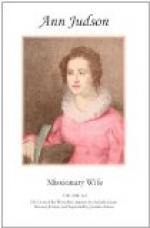But, gentle Mother, through
life’s storms,
I may not lean
on thee,
For helpless, cowering little
forms
Cling trustingly
to me—Poor babes!
To have no guide
but me!
With weary foot, and broken
wing,
With bleeding
heart, and sore,
Thy Dove looks backward, sorrowing,
But seeks the
ark no more—thy breast
Seeks never, never
more.
Sweet Mother, for this wanderer
pray,
That loftier faith
be given;
Her broken reeds all swept
away,
That she may lean
on Heaven—her soul
Grow strong on
Christ and Heaven.
All fearfully, all tearfully,
Alone and sorrowing.
My dim eye lifted to the sky,
Fast to the cross
I cling—O Christ!
To thy dear cross
I cling.
Maulmain, August 8th, 1850
From the sad voyage which drew forth this most touching poem Dr. Judson never returned. He died on board the ship which was bearing him to more healthful climes; and his body was committed to the ocean. One of the most excellent of Mrs. Judson’s productions is her account of the closing scenes in her husband’s life, contained in a letter to his sister. Long as it is, we cannot bring ourselves to abridge it. It will convince our readers that if the three whose lives we have sketched, have been among the first of women, they were united to one who knew and appreciated their excellence, and who was worthy to share their affection.
CLOSING SCENES IN THE LIFE OF DR. JUDSON.
BY HIS WIDOW.
Last month I could do no more than announce to you our painful bereavement, which though not altogether unexpected, will, I very well know, fall upon your heart with overwhelming weight. You will find the account of your brother’s last days on board the Aristide Marie, in a letter written by Mr. Ranney from Mauritius, to the Secretary of the Board; and I can add nothing to it, with the exception of a few unimportant particulars, gleaned in conversation with Mr. R. and the Coringa servant. I grieve that it should be so—that I was not permitted to watch beside him during those days of terrible suffering; but the pain, which I at first felt, is gradually yielding to gratitude for the inestimable privileges which had previously been granted me.
There was something exceedingly beautiful in the decline of your brother’s life—more beautiful than I can describe, though the impression will remain with me as a sacred legacy, until I go to meet him where suns shall never set, and life shall never end. He had been, from my first acquaintance with him, an uncommonly spiritual Christian, exhibiting his richest graces in the unguarded intercourse of private life; but during his last year, it seemed as though the light of the world on which he was entering, had been sent to brighten his upward pathway. Every




